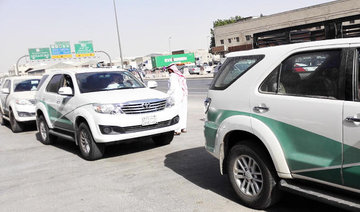RIYADH: A new Saudi passport design featuring camels posted by the Saudi Camel Club on Twitter has been praised for its attention to the Kingdom’s heritage.
The passport features a background of green colors, with a herd of camels traveling on leveled land near a mountain.
The General Directorate of Passports made no comment on the design and did not specify whether it would appear in regular or diplomatic passport categories. Many Saudis hailed the design as a dedication to national heritage and beauty.
Crown Prince Mohammed bin Salman’s Camel Club tweeted a photo of a herd of camels across two opposite pages of a Saudi passport, adding: “We are proud that our new passport is a sign of our culture and civilization.”
Many Saudis view camels as an important symbol of national identity.
Mohammed bin Tarjam, board member at Raqsh, and a marketing communications and branding expert, presented a working paper at a camel forum in 2017 referring to the animals as a “key component in strengthening national identity building.”
He emphasized the “significant role” of camels in the creation of Saudi identity, from the perspective of a “deep historical relationship.” Tarjam spoke about the importance of camel culture in disseminating the message of Prophet Muhammad and laying the foundation for the present-day Saudi state.”
His paper put forward a number of recommendations. The forum’s scientific committee adopted two recommendations, one of which was to start a project to promote national identity through “camels as an authentic cultural icon.”
The posting of camels on the pages of the Saudi passport, according to Mohammed S. Al-Otaibi, chairman of the board of the Saudi Society for Camel Studies, is “a victory for the historical Saudi identity associated with camels as a cornerstone of our great ancient and modern history.”
The camel is revered in Saudi history, he said, because “they were the means of transportation for those who remained in order to unify the vast homeland.”
Al-Otaibi said that he is “very pleased” about the passport, adding: “It puts an imprint of the glorious contemporary Saudi history beginning with the unification of the country by King Abdulaziz on the backs of camels and horses.
“I will be fond of carrying it anywhere.”
Abdullah Al-Khuzam, a member of the National Program for the Development of Handicrafts, said that camels played an important role in the lives of Saudi forefathers, and that it was that mode of transportation which united the country.
Camels should be praised for their capacity to move across difficult terrain for extended periods of time, he added.
The veteran plastic painter believes that the drawings on the new passport reflect the deep heritage and connection between man and camel.
Al-Khuzam, a well-known fine artist, said: “The images depict camels in the desert rather than as means of competition and beauty.”
He added that it is critical to connect the past with the memories of current and future generations.
“Camel, palm and desert are all icons of people in this part of the world.”


































